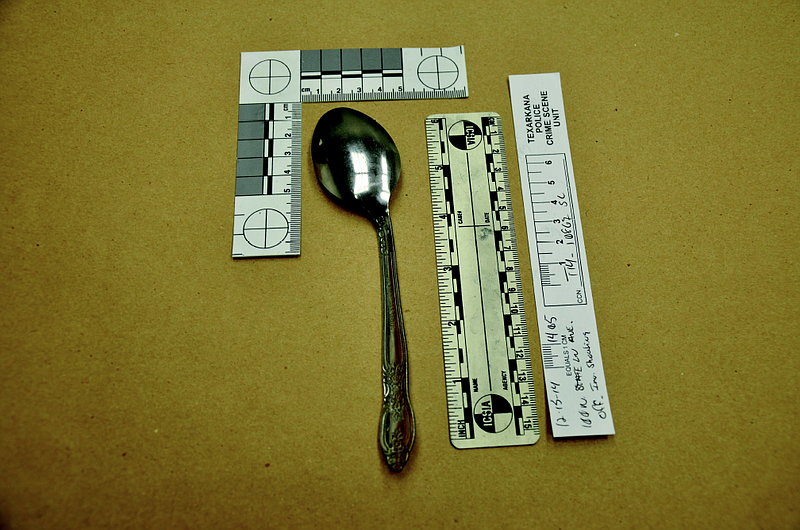A schizophrenic man was moaning the words "I'm hungry" and holding a spoon moments before he was fatally shot by a Texarkana, Texas, police officer in a neighbor's garage, according to recent filings in a wrongful-death suit.
Dennis Grigsby Jr., 35, was killed with a single shot about 2 a.m. Dec. 15, 2014, by Texas-side police officer Brent Lawing. Dennis Grigsby Jr. was barefoot, wearing pajamas and holding a metal spoon in the garage of a family who lives directly across the street from his mother on Page Street. The garage was not secured with typical doors, but the openings were covered with tarps.
The family, two adults and seven children, living in the house called 911 and frantically asked for help after hearing noise and seeing a man in their garage. Lawing was the first officer on the scene and reportedly fired because Dennis Grigsby Jr. allegedly acted aggressively and was holding an object that appeared to be a knife but turned out to be the stem of a spoon.
Grigsby's mother and father filed suit in the Texarkana Division of the Eastern District of Texas after a Bowie County grand jury declined to indict Lawing. The suit names Lawing, the city and Texarkana, Texas, Police Department as defendants. The defendants filed a motion asking that the case be dismissed earlier this month and last week the plaintiffs filed their response.
According to motions filed by both sides, Lawing pulled up in his patrol car, pulled his weapon and approached the garage. Using the flashlight, Lawing pushed aside a tarp and entered, shining his light toward Grigsby, who had apparently been tapping on a window in the garage that looked into a room used as a child's bedroom.
The plaintiff's response faults Lawing for never identifying himself to Grigsby as a police officer before pulling the trigger on his service weapon. According to the motions, Grigsby moved toward Lawing after the flashlight's beam shone at him and said, "You better shut that light out of my face."
Grigsby, who had never been warned that the person with the light was a police officer, allegedly continued to advance toward Lawing with the bowl of the spoon cupped in his hand and the stem protruding from his fist. Lawing, who claims he thought the spoon's stem was a knife, said, "Hey, set it down. Set it down, man. Set it down," before firing a bullet into Grigsby's chest.
The defendants, represented by Texarkana lawyers Bob Weber and David Glass of the Smith Weber firm, claim Lawing went to the source of the threat as he was trained to do and that he perceived a deadly threat when he mistook the stem of a spoon for a knife in a darkened space. Grigsby's parents, represented by Derrell Coleman of the Shaw Law Group in Gun Barrel City, Texas, allege Lawing should have identified himself as a police officer, particularly in light of information from dispatchers that the "burglar" in the Page Street garage was wearing pajamas on a cool December night and Grigsby's audible moaning that he was hungry.
In a deposition of Lawing attached as an exhibit, Lawing testified that he remembers hearing the tapping sound in the garage but denies he heard Grigsby's moans. Coleman asks Lawing in the deposition if the sounds of Grigsby tapping and the sound of him moaning recorded by Lawing's body microphone are of a similar volume and Lawing agrees they are. The plaintiffs accuse Lawing of using excessive force and note that Lawing never identified himself as law enforcement, while the defendants argue the case should not go forward because Lawing acted in conformity with his training in a circumstance where he believed his life was in danger.
The case is scheduled for a hearing later this week before U.S. Magistrate Judge Caroline Craven in Texarkana's downtown federal building.

